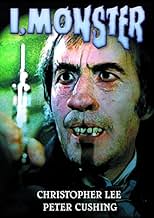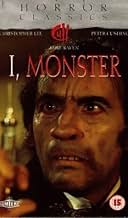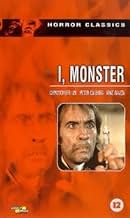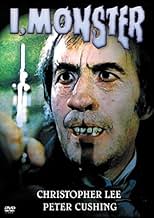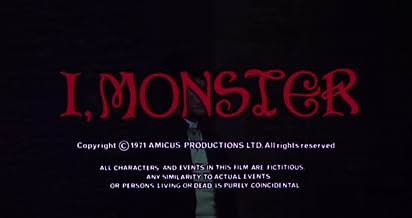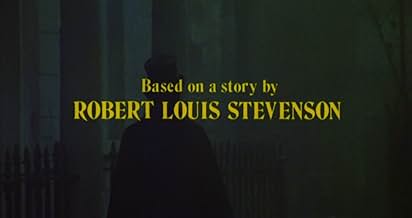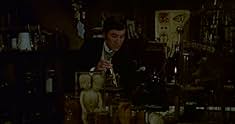IMDb RATING
5.7/10
2.2K
YOUR RATING
19th-century London psychologist Charles Marlowe experiments with a mind-altering drug. He develops a malevolent alter ego, Edward Blake, who his friend Utterson suspects of blackmailing Mar... Read all19th-century London psychologist Charles Marlowe experiments with a mind-altering drug. He develops a malevolent alter ego, Edward Blake, who his friend Utterson suspects of blackmailing Marlowe.19th-century London psychologist Charles Marlowe experiments with a mind-altering drug. He develops a malevolent alter ego, Edward Blake, who his friend Utterson suspects of blackmailing Marlowe.
- Director
- Writers
- Stars
Aimée Delamain
- Landlady
- (as Aimee Delamain)
Jim Brady
- Pub Patron
- (uncredited)
Chloe Franks
- Girl in Alley
- (uncredited)
Lesley Judd
- Woman in Alley
- (uncredited)
Ian McCulloch
- Man At Bar
- (uncredited)
Reg Thomason
- Man in Pub
- (uncredited)
Fred Wood
- Pipe Smoker (with Cap) in Pub
- (uncredited)
- Director
- Writers
- All cast & crew
- Production, box office & more at IMDbPro
Featured reviews
I, MONSTER is Amicus Studios' version of Robert Louis Stevenson's Dr. Jekyll And Mr. Hyde.
Dr. Marlowe (Christopher Lee) is working on a serum that will bring out the dark side of human nature. Using Freud as his guide, Marlowe uses his concoction on a female test subject, turning her from prim and proper to the exact opposite thereof. After another successful test on an ill-tempered man, Marlowe tries the serum out on himself.
Needless to say, the effects are dramatic, transforming the mild-mannered Marlowe into an id-driven maniac with only base desires on his mind. He heads for the seedier part of town where he can do as he pleases without regard or remorse.
As in the original tale, no good comes of this, as Marlowe slides ever deeper into the abyss. Not even children's lives are spared. A colleague (Peter Cushing) suspects Marlowe and sets out to stop him.
Lee and Cushing are always good together and this is no exception. This fairly faithful take on the source material highlights both men's strengths. Definitely one of Amicus' better movies...
Dr. Marlowe (Christopher Lee) is working on a serum that will bring out the dark side of human nature. Using Freud as his guide, Marlowe uses his concoction on a female test subject, turning her from prim and proper to the exact opposite thereof. After another successful test on an ill-tempered man, Marlowe tries the serum out on himself.
Needless to say, the effects are dramatic, transforming the mild-mannered Marlowe into an id-driven maniac with only base desires on his mind. He heads for the seedier part of town where he can do as he pleases without regard or remorse.
As in the original tale, no good comes of this, as Marlowe slides ever deeper into the abyss. Not even children's lives are spared. A colleague (Peter Cushing) suspects Marlowe and sets out to stop him.
Lee and Cushing are always good together and this is no exception. This fairly faithful take on the source material highlights both men's strengths. Definitely one of Amicus' better movies...
"I, Monster" is a respectable adaptation of the classic Robert Louis Stevenson tale of Jekyll & Hyde, albeit with some unconventional touches by screenwriter Milton Subotsky. Sir Christopher Lee stars as Dr. Marlowe, a psychiatrist / researcher who experiments with drugs, trying to get his patients to release their inhibitions. But when he tests his serum on himself, the results are predictable enough. He becomes an unhinged alter ego named Edward Blake, who indulges in debauched and nasty acts for their own sake. Meanwhile, Marlowes' lawyer Utterson (Peter Cushing) believes Marlowe and Blake to be two different people and thinks that the Blake character is blackmailing Marlowe.
While this slight film doesn't have quite enough style or gravitas to rate as anything more than routine entertainment, it's still reasonably well done. Produced by horror greats Amicus, its period recreation is decent, and its atmosphere likewise effective. Subotsky's touches include having Marlowe be a follower of Freud, so there are Freudian overtones, and the topic of the role that drugs play - or shouldn't play - in the treatment of patients. It does have the time honored appeal of any story with a Frankenstein type mad doctor twist. The makeup by Harry and Peter Frampton is pretty good, but the amount used on Lee is increased bit by bit on screen rather than utilized all at once. The music by Carl Davis is good. As directed by Stephen Weeks, a 22 year old budding filmmaker hired by Amicus at Lees' suggestion, it's actually not terribly violent - or as sexy as the stuff churned out by Hammer during this period. Much of the budget went towards an unusual 3D process exploiting the Pulfrich effect (which explains the camera movement), one that wasn't exactly pleasant to film for Lee.
As can be expected, the consistent professionalism and commitment to character by the two stars makes it all worthwhile. They're ably supported by exemplary actors such as Mike Raven, Richard Hurndall, George Merritt, and Kenneth J. Warren. That's a young Michael Des Barres as the youth who accosts Blake in the alley.
Agreeable entertainment, overall, although the ending is rather abrupt.
Six out of 10.
While this slight film doesn't have quite enough style or gravitas to rate as anything more than routine entertainment, it's still reasonably well done. Produced by horror greats Amicus, its period recreation is decent, and its atmosphere likewise effective. Subotsky's touches include having Marlowe be a follower of Freud, so there are Freudian overtones, and the topic of the role that drugs play - or shouldn't play - in the treatment of patients. It does have the time honored appeal of any story with a Frankenstein type mad doctor twist. The makeup by Harry and Peter Frampton is pretty good, but the amount used on Lee is increased bit by bit on screen rather than utilized all at once. The music by Carl Davis is good. As directed by Stephen Weeks, a 22 year old budding filmmaker hired by Amicus at Lees' suggestion, it's actually not terribly violent - or as sexy as the stuff churned out by Hammer during this period. Much of the budget went towards an unusual 3D process exploiting the Pulfrich effect (which explains the camera movement), one that wasn't exactly pleasant to film for Lee.
As can be expected, the consistent professionalism and commitment to character by the two stars makes it all worthwhile. They're ably supported by exemplary actors such as Mike Raven, Richard Hurndall, George Merritt, and Kenneth J. Warren. That's a young Michael Des Barres as the youth who accosts Blake in the alley.
Agreeable entertainment, overall, although the ending is rather abrupt.
Six out of 10.
This odd adaption of Dr Jekyll and Mr Hyde was originally shot in a rare form of 3-D which depends on a complicated camera move, much to the annoyance of star Christopher Lee. But it was all worth it, Mr. Lee, because it stands now as your only 3-D movie for us to enjoy today! The 3-D only works when the camera is moving left to right or right to left and you need special glasses (with the right lens slightly darkened) to enjoy it. But in 3-D, the creeping camera moves and slow editing all make sense because the scenes spring to life with deep focussed 3-dimensional action. Now you know why Christopher Lee is always walking up and down his laboratory behind all the chemical glassware!
This is a version of 'Dr. Jekyll and Mr. Hyde', although the credits ('based on a story by Robert Louis Stevenson'), the name changes (only Utterson and Hyde's first name survive) and the opening 20 minutes (Marlowe's scientific experiments could belong to any similar Hammer film) seem to want to conceal the fact (presumably to make the familiar story unfamiliar again).
Having said that, 'I, Monster' is the most faithful of all adaptations of Stevenson's great novella. There is a little chronological tinkering with narrative, and the setting is moved forward by two decades; but the plot and characters are largely Stevenson's. The error made by most versions of making Jekyll good and Hyde bad is avoided - Jekyll/Marlowe is from the start morose, anti-social, sadistic, voyeuristic and scientifically dubious. There is no Hollywood love-interest, pucelle/putain story to simplify Marlowe's dilemma, retaining the claustrophobic, homosocial world evoked by Stevenson.
Instead of the usual Victorian, cod-Gothic fug, the novella's dream-like modernity is stretched, with effective use made of silence and an unnaturally depopulated urban labyrinth. The transformation scenes, usually an excuse for distracting effects-extravaganza, are brilliantly subtle here, usually off-screen. The 'revelatory' scene (when Blake reveals himself to a friend) is done in silhouette, which is more evocative and thematically appropriate. Christopher Lee's patrician adventurousness is effectively contrasted with Peter Cushing's dogged dullness.
Of course, when I say 'I, Monster' is more faithful than most, it's still not very faithful at all. The duality in Stevenson, whereby Jekyll and Hyde being the same person is concealed till the end, is ignored here. More pertinently, setting the novel in 1906 makes the story seem perversely anachronistic, where Victorian ideas and motifs (sexual repression, duality, mad science etc.) seem out of place in Edwardian England. There is a reason for this - Marlowe is a devotee of Freud, and Jekyll's attempt to isolate, and hence exterminate, the essence of evil, is given a psychoanalytical spin, where the duality is not between respectability and desire, but the ego/super-ego and the Id.
This is interesting for two reasons. Firstly, Freud's ideas of the mind are transferred to the body, giving resonance to Marlowe's physical changes, the animal imagery throughout, and the violence he inflicts, as well as making more poignant the climactic 'melding', where Marlowe can no longer divorce his dark side at will. Secondly, Freud provides an explanatory framework for the story, most notably an Oedipal one. Blake runs riot with a cane that reminds Marlowe of the one his violent, 'respectable' father used; the absence of women in his social world, his horrifying violence to women, and some of the seemingly irrelevant asides (the photos that loom in his room like an invading army, etc.) all suggestively deepen our reaction to Marlowe's plight.
This Amicus production is reminiscent of the best Hammers - eg 'The Creeping Flesh' - where the emphasis is less on gore and sensation than suggestion, atmosphere, or slow menacing camerawork; a meaningful use of decor; dream-like sequences; elliptical editing; rich symbolism.
And as with those great Hammers, there are some searing set-pieces - the opening credits in Marlowe's laboratory, with its dead Siamese twin foetuses, its caged animals and images of fragmentary body parts; Marlowe's first injection and 'self-discovery' with the mirror (more Freud via Lacan) and 'new' point of view; the knife tussle at dawn in a narrow lane in a proletarian milieu; the voyeuristic scenes in his adopted hotel room, with its low-level, tilted camera; the social humiliation when he tries to pick up a prostitute, suggesting he hasn't quite overthrown the sensitive super-ego; the trampling of a young girl. Lee, usually so authoritarian and calm, gets a rare chance to be weak and is excellent; his hurt at having to kill his tabby is very moving. Also excellent is the score, ironic and commentating rather than underpinning or atmospheric; frequently comic, but never - ever - spoofy.
Having said that, 'I, Monster' is the most faithful of all adaptations of Stevenson's great novella. There is a little chronological tinkering with narrative, and the setting is moved forward by two decades; but the plot and characters are largely Stevenson's. The error made by most versions of making Jekyll good and Hyde bad is avoided - Jekyll/Marlowe is from the start morose, anti-social, sadistic, voyeuristic and scientifically dubious. There is no Hollywood love-interest, pucelle/putain story to simplify Marlowe's dilemma, retaining the claustrophobic, homosocial world evoked by Stevenson.
Instead of the usual Victorian, cod-Gothic fug, the novella's dream-like modernity is stretched, with effective use made of silence and an unnaturally depopulated urban labyrinth. The transformation scenes, usually an excuse for distracting effects-extravaganza, are brilliantly subtle here, usually off-screen. The 'revelatory' scene (when Blake reveals himself to a friend) is done in silhouette, which is more evocative and thematically appropriate. Christopher Lee's patrician adventurousness is effectively contrasted with Peter Cushing's dogged dullness.
Of course, when I say 'I, Monster' is more faithful than most, it's still not very faithful at all. The duality in Stevenson, whereby Jekyll and Hyde being the same person is concealed till the end, is ignored here. More pertinently, setting the novel in 1906 makes the story seem perversely anachronistic, where Victorian ideas and motifs (sexual repression, duality, mad science etc.) seem out of place in Edwardian England. There is a reason for this - Marlowe is a devotee of Freud, and Jekyll's attempt to isolate, and hence exterminate, the essence of evil, is given a psychoanalytical spin, where the duality is not between respectability and desire, but the ego/super-ego and the Id.
This is interesting for two reasons. Firstly, Freud's ideas of the mind are transferred to the body, giving resonance to Marlowe's physical changes, the animal imagery throughout, and the violence he inflicts, as well as making more poignant the climactic 'melding', where Marlowe can no longer divorce his dark side at will. Secondly, Freud provides an explanatory framework for the story, most notably an Oedipal one. Blake runs riot with a cane that reminds Marlowe of the one his violent, 'respectable' father used; the absence of women in his social world, his horrifying violence to women, and some of the seemingly irrelevant asides (the photos that loom in his room like an invading army, etc.) all suggestively deepen our reaction to Marlowe's plight.
This Amicus production is reminiscent of the best Hammers - eg 'The Creeping Flesh' - where the emphasis is less on gore and sensation than suggestion, atmosphere, or slow menacing camerawork; a meaningful use of decor; dream-like sequences; elliptical editing; rich symbolism.
And as with those great Hammers, there are some searing set-pieces - the opening credits in Marlowe's laboratory, with its dead Siamese twin foetuses, its caged animals and images of fragmentary body parts; Marlowe's first injection and 'self-discovery' with the mirror (more Freud via Lacan) and 'new' point of view; the knife tussle at dawn in a narrow lane in a proletarian milieu; the voyeuristic scenes in his adopted hotel room, with its low-level, tilted camera; the social humiliation when he tries to pick up a prostitute, suggesting he hasn't quite overthrown the sensitive super-ego; the trampling of a young girl. Lee, usually so authoritarian and calm, gets a rare chance to be weak and is excellent; his hurt at having to kill his tabby is very moving. Also excellent is the score, ironic and commentating rather than underpinning or atmospheric; frequently comic, but never - ever - spoofy.
With this feature, Amicus Studios (a British production company founded merely to cash in on the huge success of contemporary competitor Hammer, though with lower budgets and mainly specializing in anthology films) attempted to present its very own adaptation of the legendary and numerously retold novel "Dr. Jekyll and Mr. Hyde", by Robert Louis Stevenson. However, "I, Monster" turned out to be a rather curious movie and I honestly can't say for sure what it was that Amicus wanted to achieve and whether or not they succeeded in their effort. At first I assumed "I, Monster" was going to be only loosely inspired by the classic story, since there already are so many reminiscent versions available on the market and even more so because the screenplay changes the names of the protagonist from Dr. Jekyll and Mr. Hyde into Dr. Marlowe and Mr. Blake. But then it rapidly becomes obvious that this is actually one of the faithful adaptations of Stevenson's story, so that can't be an option. On a slightly off-topic note, in case you are looking for an offbeat and extremely loose interpretation of the same story, you can turn to the aforementioned Hammer again and check out "Dr. Jekyll and Sister Hyde". Maybe the original mission was to make the very first 3-D version of "Jekyll and Hyde", but that idea got abandoned in a fairly early stage as well and it's only still noticeable in some minor visual and cinematographic details. So, basically, all that remains is another redundant but nevertheless worthwhile re-enactment of a fantastic tale, once more pairing two of the greatest horror actors ever (Peter Cushing and Christopher Lee) and competently directed by one of the youngest filmmakers of that time. Stephen Weeks was still in his early twenties in 1971. I bet it must be a truly unique experience to give Lee and Cushing instructions on a film set on that age...
Lee and Cushing don't deliver their greatest performances here (far from it actually), but even at their most mediocre they nonetheless remain a joy to behold. Lee stars as Dr. Marlowe, a successful psychiatrist and devoted disciple of Sigmund Freud's theories. He firmly believes that mental illnesses can be caused by the repression of the true human nature (which is vile, mean and aggressive) and that both sides of the personality can easily be separated. He develops a drug, experiments on himself and gradually turns into a more relentless and incurable monster after each injection. His friends, including Peter Cushing as his attorney, want to help Dr. Marlowe but they automatically assume this mysterious Mr. Blake is an entirely different persona. The overall story is commonly known and this version doesn't feature any noteworthy differences. The doctor's transformations - mentally as well as physically - grow more monstrous, but the remarkable thing is he is the scariest during the earliest phases! Near the film's climax, Christopher Lee looks unrecognizable and heavily deformed but after the first couple of drug dosages he simply puts on a menacing and genuinely unsettling Joker-type of smile. Can you imagine Christopher Lee with a big smile like that? Now, THAT is scary stuff!
Lee and Cushing don't deliver their greatest performances here (far from it actually), but even at their most mediocre they nonetheless remain a joy to behold. Lee stars as Dr. Marlowe, a successful psychiatrist and devoted disciple of Sigmund Freud's theories. He firmly believes that mental illnesses can be caused by the repression of the true human nature (which is vile, mean and aggressive) and that both sides of the personality can easily be separated. He develops a drug, experiments on himself and gradually turns into a more relentless and incurable monster after each injection. His friends, including Peter Cushing as his attorney, want to help Dr. Marlowe but they automatically assume this mysterious Mr. Blake is an entirely different persona. The overall story is commonly known and this version doesn't feature any noteworthy differences. The doctor's transformations - mentally as well as physically - grow more monstrous, but the remarkable thing is he is the scariest during the earliest phases! Near the film's climax, Christopher Lee looks unrecognizable and heavily deformed but after the first couple of drug dosages he simply puts on a menacing and genuinely unsettling Joker-type of smile. Can you imagine Christopher Lee with a big smile like that? Now, THAT is scary stuff!
Did you know
- TriviaChristopher Lee (Dr. Charles Marlowe / Mr. Edward Blake) previously played Paul Allen in Les Deux Visages du Dr Jekyll (1960), another film adaptation of Robert Louis Stevenson's 1886 novella "Strange Case of Dr. Jekyll and Mr. Hyde."
- GoofsAt c. 53:00 into the film, Utterson says he would recognize the exact details of the ornate head of Blake's cane. However, he has only seen this cane for a fraction of a second at nighttime, when it was used to assault him earlier in the film.
- Quotes
Dr. Charles Marlowe: The face of evil is ugly to look upon. And as the pleasures increase, the face becomes uglier.
- Alternate versionsOn Blu-ray, the film was released for the first time by Powerhouse Films in the UK. In addition to the theatrical version, there is the option to watch the extended version, which features two additional scenes. You can see Marlowe working in the lab, more conversations in the club and a conversation of Marlowe with his patient Diane. The scenes mainly deepen the theme of human duality, but are not strictly necessary.
- ConnectionsFeatured in The Many Faces of Christopher Lee (1996)
- SoundtracksEine Kleine Nachtsmusik
By Wolfgang Amadeus Mozart (uncredited)
- How long is I, Monster?Powered by Alexa
Details
- Runtime
- 1h 15m(75 min)
- Aspect ratio
- 1.85 : 1
Contribute to this page
Suggest an edit or add missing content


